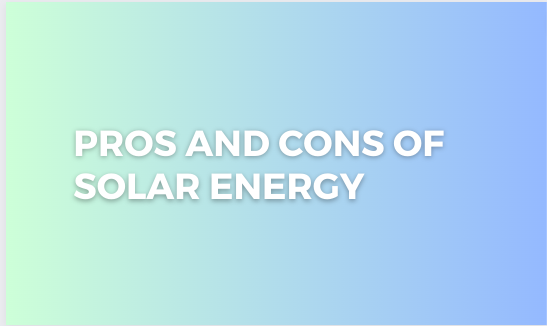Solar energy, derived from the sun’s radiation, has gained significant attention as a renewable and sustainable energy source. Its adoption has been driven by the advantages it offers in terms of environmental impact and energy independence. In this analysis, we will examine pros and cons of solar energy to understand its benefits and challenges.
Pros:
- Renewable and sustainable: Solar energy is a renewable resource that does not deplete the Earth’s natural resources.
- Reduced carbon footprint: Solar energy produces minimal greenhouse gas emissions, contributing to the fight against climate change.
- Energy independence: Solar energy reduces dependence on fossil fuels and foreign energy sources.
- Lower energy costs: Solar power can lead to long-term savings on energy bills.
- Job creation: The solar industry creates job opportunities in manufacturing, installation, and maintenance.
- Long lifespan: Solar panels have a long lifespan, typically lasting for several decades.
- Low maintenance: Solar energy systems require minimal maintenance after installation.
- Diverse applications: Solar energy can be used for electricity generation, heating, and even transportation.
- Scalability: Solar systems can be scaled up or down to meet different energy needs.
- Remote access: Solar energy can be harnessed in remote areas without access to the electrical grid.
- Reduced transmission losses: Solar power generation near the point of consumption reduces transmission losses.
- Improved grid resilience: Distributed solar systems increase the resilience of the power grid against outages and natural disasters.
- Technology advancements: Ongoing advancements in solar technology are improving efficiency and reducing costs.
- Positive environmental impact: Solar energy helps to preserve ecosystems and reduce pollution associated with fossil fuel extraction and combustion.
- Inexhaustible energy source: The sun provides an abundant and inexhaustible source of energy.
- Energy storage options: Solar energy can be paired with energy storage systems for continuous power supply.
- Reduced reliance on finite resources: Solar energy reduces dependence on limited fossil fuel reserves.
- Local economic benefits: The adoption of solar energy can stimulate local economies through investment and job creation.
- Financial incentives: Many governments offer financial incentives such as tax credits and grants to encourage solar energy adoption.
- Modular design: Solar energy systems can be easily expanded or modified based on energy requirements.
Cons:
- High upfront costs: The initial installation cost of solar energy systems can be relatively high.
- Intermittent energy source: Solar energy generation is dependent on sunlight and is intermittent, requiring energy storage or backup systems.
- Land use requirements: Large-scale solar installations may require significant land area, potentially impacting ecosystems and agriculture.
- Weather dependency: Cloudy weather and reduced sunlight can affect the efficiency of solar energy systems.
- Limited energy density: Solar energy has a lower energy density compared to fossil fuels, requiring larger areas for energy production.
- Manufacturing emissions: The manufacturing process of solar panels can produce emissions and waste.
- Dependency on rare materials: Solar panel production relies on certain rare materials, potentially leading to supply chain challenges.
- Visual impact: Large solar installations may have visual impacts on the landscape.
- Limited nighttime energy production: Solar energy production is minimal or non-existent during nighttime hours.
- Storage challenges: Storing excess solar energy for nighttime use can be technically and economically challenging.
- Geographical limitations: The effectiveness of solar energy may vary depending on geographical location and climate conditions.
- Complex installation: Installing solar energy systems can be complex and require professional expertise.
- Potential for wildlife disruption: Large solar installations can disrupt local wildlife habitats and migration patterns.
- Waste management: Solar panels have a limited lifespan and require proper disposal to avoid environmental impacts.
- Heat island effect: Concentrated solar installations can contribute to the urban heat island effect.
- Energy payback time: The energy payback time for solar panels can vary, impacting the overall environmental benefit.
- Aesthetics: Some people may find the appearance of solar panels unappealing.
- Energy transmission challenges: Transmitting solar energy over long distances can encounter transmission losses and infrastructure challenges.
- Grid integration: Integrating solar energy into existing power grids may require upgrades and changes to the infrastructure.
- Variability in output: Solar energy output can vary depending on factors such as time of day and weather conditions.
Pros
- Renewable and sustainable
- Reduced carbon footprint
- Energy independence
- Lower energy costs
- Job creation
- Long lifespan
- Low maintenance
- Diverse applications
- Scalability
- Remote access
- Reduced transmission losses
- Improved grid resilience
- Technology advancements
- Positive environmental impact
- Inexhaustible energy source
- Energy storage options
- Reduced reliance on finite resources
- Local economic benefits
- Financial incentives
- Modular design
Cons
- High upfront costs
- Intermittent energy source
- Land use requirements
- Weather dependency
- Limited energy density
- Manufacturing emissions
- Dependency on rare materials
- Visual impact
- Limited nighttime energy production
- Storage challenges
- Geographical limitations
- Complex installation
- Potential for wildlife disruption
- Waste management
- Heat island effect
- Energy payback time
- Aesthetics
- Energy transmission challenges
- Grid integration
- Variability in output



